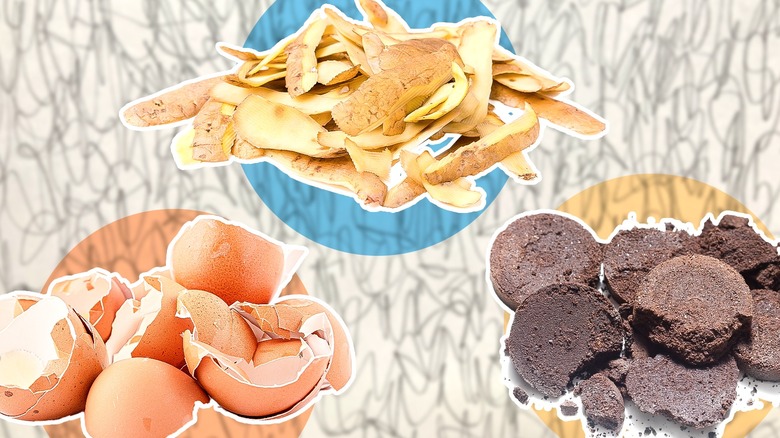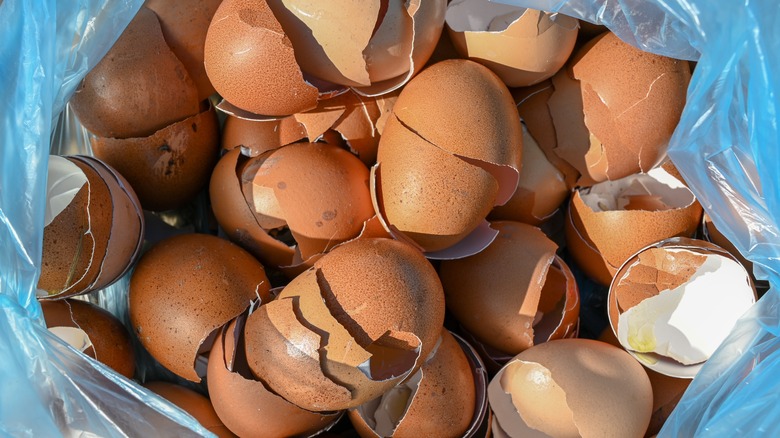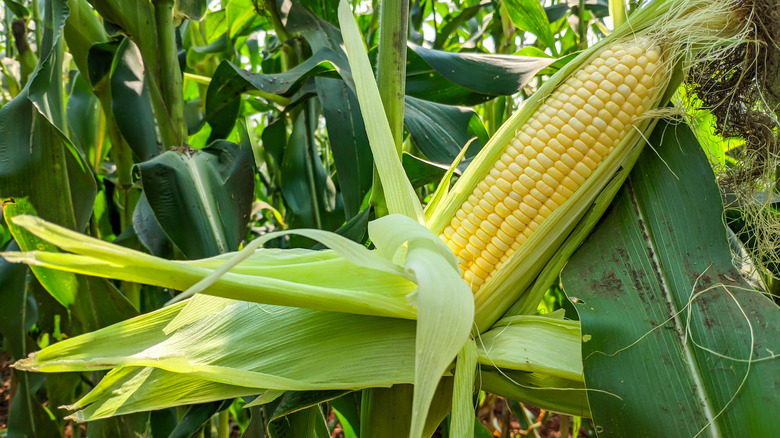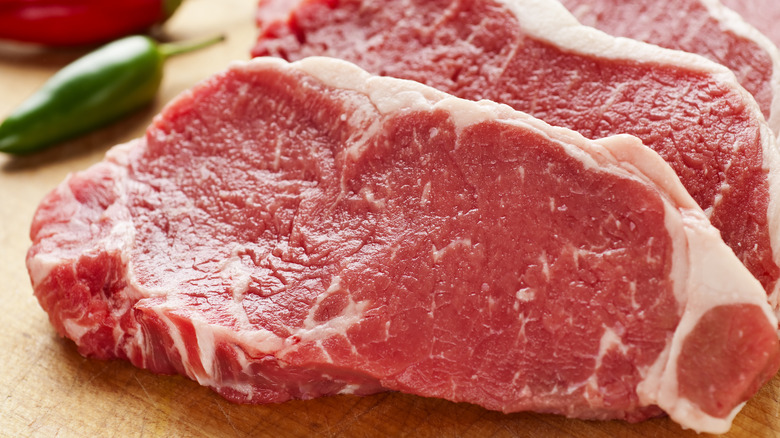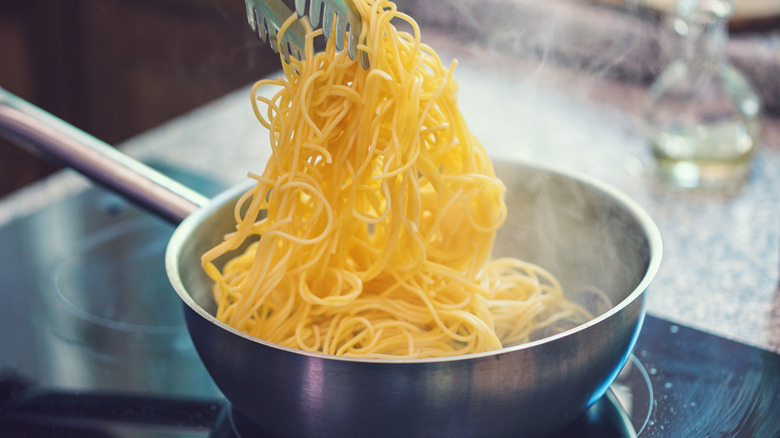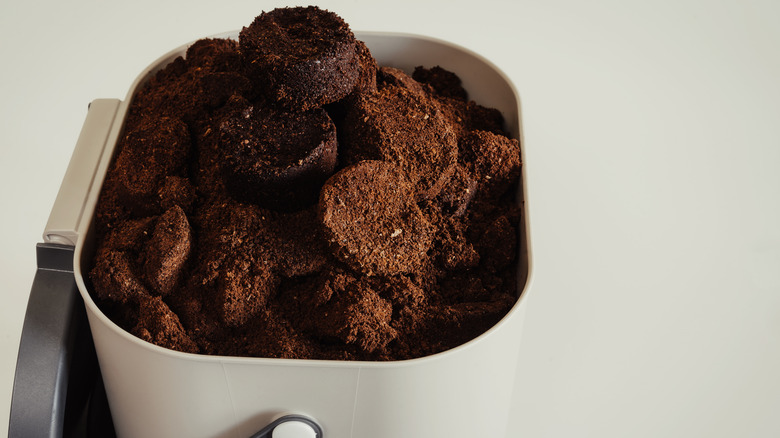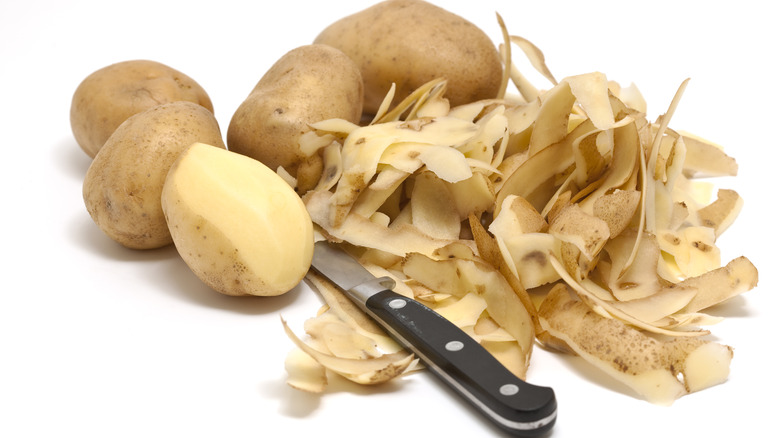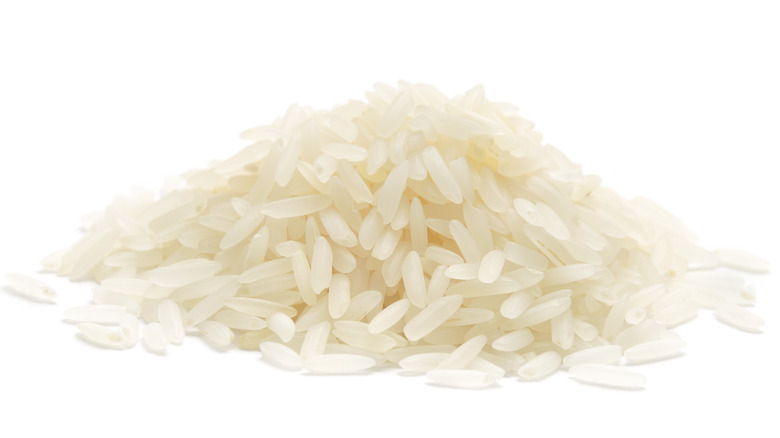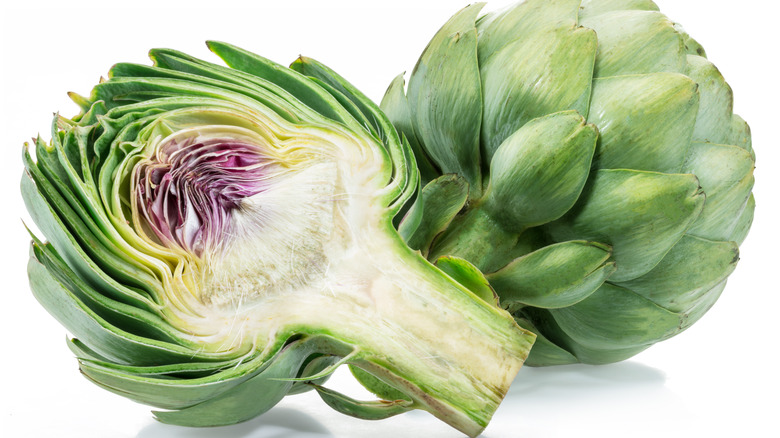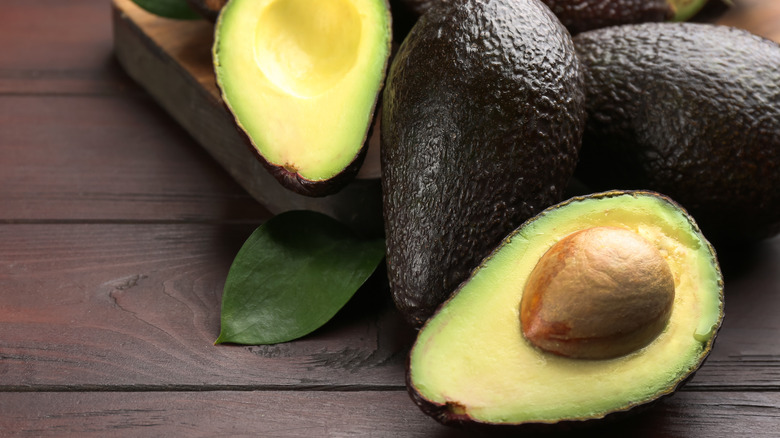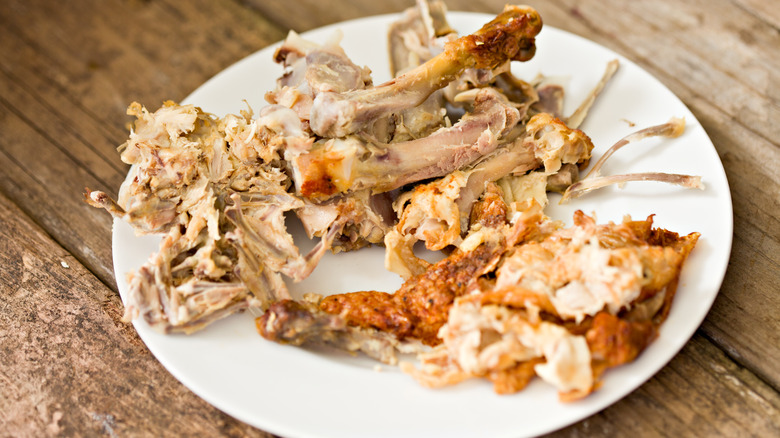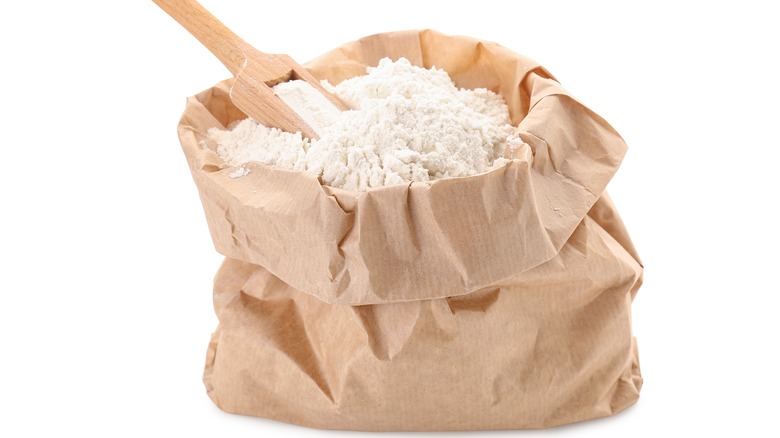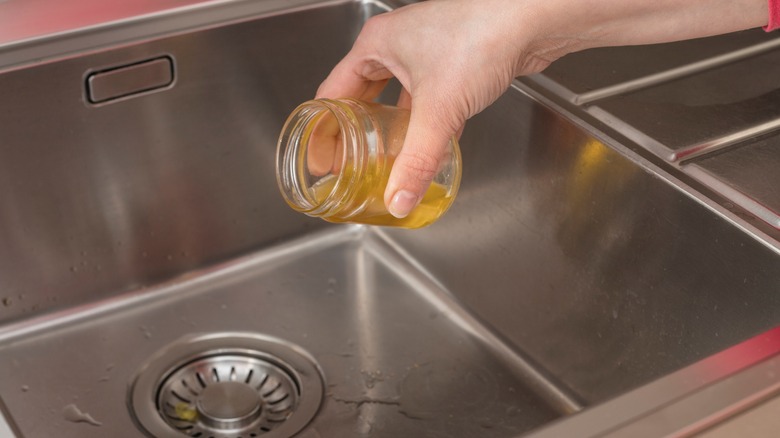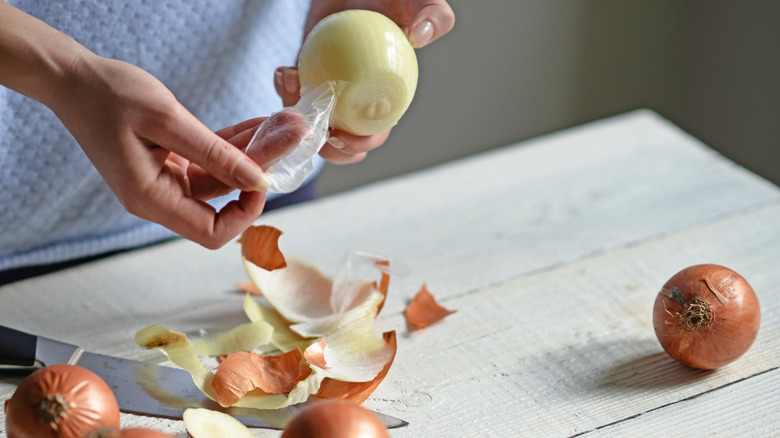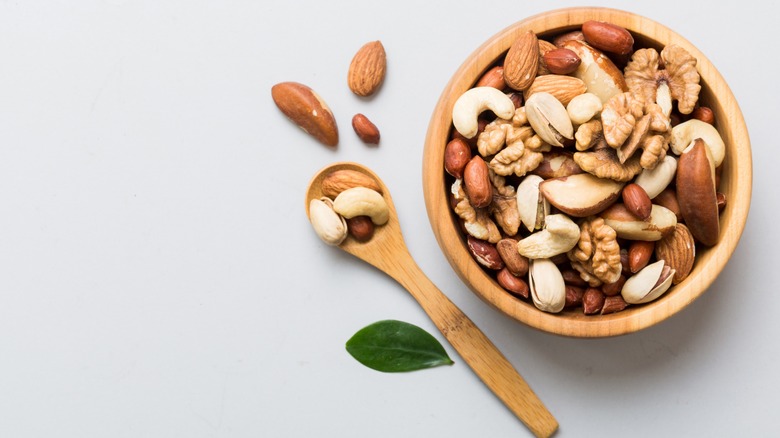14 Food Scraps You Should Never Put Down The Garbage Disposal
It's no exaggeration to say household appliances have revolutionized our kitchen routines — changing the way we prepare, cook, and clean. Consider how effectively and efficiently a dishwasher handles the dish-cleaning process (saving you time and effort); or take the blender, which effortlessly whips up everything from smoothies to soups with a finger's touch. Of course, while these two machines are hard to overlook, one kitchen appliance often flies under the radar: the garbage disposal.
A garbage disposal can be easy to forget given its unassuming look and out-of-sight station beneath the sink. But seeing how it's responsible for grinding up leftover food scraps and keeping our pipes clear — two pretty important tasks, if you ask us — the appliance's oft-forgotten status is a shame. Given just how essential it is, then, it's vital to keep the appliance in good working order.
One of the best ways to keep your garbage disposal in top shape is to watch what you're throwing down the drain. Despite a name that suggests it can handle anything, there are limits ... and potential consequences if you consistently use it to dispose of the wrong types of food. With that in mind, we assembled a guide of what to avoid to help assist you. Here are 14 food scraps you should never put down the garbage disposal.
Eggshells
Egg shells are the type of food scrap that inspires a lot of debate (at least when it comes to their effect on garbage disposals). On one hand, you have eggshell-tossing proponents who argue the shells' rough texture can help clean the internal grinding mechanisms and sharpen a garbage disposal's blades — thereby improving its functionality over time. Others in this camp posit eggshells won't do any harm because they're so small and easily demolished.
Yet these assertions are misguided for several reasons. First, garbage disposals don't use blades: They use a rotating impeller to push food bits into a stationary ring (which does the actual crushing). Moreover, though eggshells are tiny, they won't necessarily break down very quickly after sliding down the drain. As a result, the crushed-up pieces can accumulate in pipes over time and potentially clog your plumbing system.
One final reason to avoid throwing eggshells down the drain revolves around the membrane inside the shell. This membrane can become entangled in a garbage disposal's parts, which, in turn, may impede normal operations and create foul odors that permeate your entire kitchen. Given these potential risks, toss your eggshells in the trash or compost bin next time. Better yet? Sprinkle them onto your garden to give your plants an extra boost of calcium.
Corn husks
Given the effort required to shuck corn, boil or grill the ears to perfection, then carefully remove the kernels? The temptation to dispose of the husks down the drain is understandable. But while you may believe there's no harm in taking a little shortcut after all that hard work, we encourage you to fight it — if only for the sake of your garbage disposal's health.
There are several reasons why you should never put corn husks down a garbage disposal. First off, the plant's tough and fibrous leaves are resistant to breaking down in the disposal. These fibers tend to get tangled in the impeller, which can cause the motor to jam (and your appliance to stop working). The other issue is corn's stringy silk; though seemingly harmless, these strands don't always slip through the disposal and smoothly exit your plumbing system. Rather, corn silk often forms knots that block pipes and result in backups, a call to the plumber, and shelling out money for repairs or a replacement.
A better way to handle corn husks is to simply toss them in the trash, or repurpose them in some capacity. Corn husks can be used as compost, to feed farm animals, to cook tamales, or as a crucial component in your next craft project.
Meat
Understanding the rules for meat and your garbage disposal can be tricky. But fear not — we're here to explain why you should think twice before putting meat down a garbage disposal. The key distinction lies in whether the meat is raw or cooked. For starters, you should keep raw meat away from your garbage disposal at all costs. Just like corn husks and fibrous veggies, the muscle fibers in raw meat may tangle and clog the mechanism, leading to potential malfunctions. A better option is to seal raw meat in a plastic bag (to deter rodents) and toss it in the trash.
Now, when it comes to cooked meat, a few pieces down the sink isn't the end of the world. Cooking softens the flesh which makes it easier for the garbage disposal to grind up. But before you get too excited and start using the garbage disposal for all of your leftover meat, you'll still want to limit the amount you're tossing down the drain. While your garbage disposal can occasionally handle smaller amounts of cooked meat, it's not a good idea to throw half a flank steak down the drain every week since it may still strain the garbage disposal's motor.
Additionally, you'll want to avoid taxing your appliance with fatty or bony morsels, as well. Given these caveats, you're better off just putting cooked meat in the garbage can rather than down the drain.
Pasta
When you craft a delectable pasta dish like spaghetti carbonara, chances are you won't have many leftovers. However, if you do happen to find yourself with some pasta that can't be saved, do yourself a favor and dispose of it in the trash rather than down your garbage disposal.
The main reason to avoid dumping pasta down the garbage disposal lies in the shape and structure of the food itself. Long, slender pasta varieties, such as spaghetti or linguini, are particularly prone to tangling around the inner mechanisms of the appliance — potentially jamming the disposal and bringing it to a halt.
Beyond the risk of tangling, pasta can pose issues for your pipes, as well. Since it may not get properly pulverized in the garbage disposal, any remaining pasta strands may instead slide down the pipes. Since cooked pasta has the potential to expand due to water absorption over time, it can consequently lead to clogs. If you do accidentally let pasta go down the drain, simply run the disposal for 30 seconds and rinse with cold water to reduce the risk of additional swelling.
Coffee grounds
Whether you're a French press fan or drip devotee, you're bound to end up with leftover grounds once you finish brewing your morning coffee. While you might be tempted to wash these grounds down the drain during cleanup, we strongly recommend you never put coffee grounds down your garbage disposal.
Coffee grounds don't play well with garbage disposals due to their small size and already-crushed texture. As a result, they tend to build up and create a troublesome sticky sludge in the pipes beneath your disposal. Since you can probably guess the outcome of this issue — clogs — you should steer clear of unnecessary repair costs and toss your coffee grounds in the garbage.
If that doesn't satisfy you, there are plenty of creative ways to repurpose used coffee grounds. From incorporating them into your next steak rub to flavoring your homemade coffee stout, or scrubbing pans and deodorizing your home, coffee grounds are incredibly versatile food scraps to keep around (just not in your garbage disposal).
Potato peels
You're hardly alone if you ever tossed potato peels down the garbage disposal. But while other veggie scraps are generally fine for this appliance, potato peels can pose a big problem.
One key reason to avoid putting potato peels down the drain is that garbage disposals function by grinding food scraps into a liquid — one that flows easily through your pipes and out of your home without issue. Unfortunately, given the slippery and fibrous texture of potato peels, they may manage to evade this mechanism and enter the pipes fully formed, leading to potential clogs virtually anywhere in your system.
Another reason why potato peels are problematic in garbage disposals is their starchy composition. Similar to pasta, potato peels absorb water and expand over time, which could contribute to blockages — though you can sidestep any plumbing issues (and avoid costly repairs) by disposing of peels in the trash or composting them. You can also transform them into a tasty snack or appetizer by dressing them up with olive oil, rosemary, and salt and roasting them in the oven.
Rice
Leftover rice is a versatile ingredient to keep around the house. You can scoop it into a soup, roll it inside a burrito, or even add it to a baked frittata. Yet for all its versatility, there's one place rice does not belong: the garbage disposal. If you're wondering what makes rice so problematic for your garbage disposal, the main reason lies in its texture. When wet, cooked rice often morphs into a sticky, glue-like substance that (you guessed it) can cause potential blockages in both your garbage disposal and overall plumbing system.
Of course, even if a few stray grains aren't likely to cause much trouble, a substantial amount is bound to create some issues – meaning you should still stop putting rice down the drain. If you do find yourself facing such an inconvenience, try pouring boiling water down the drain to help break up the clog. Should the problem persist, a mixture of baking soda and vinegar often proves effective in clearing it — and may help save you a few bucks by eliminating the need for professional assistance.
Fibrous vegetables
Navigating the lengthy and seemingly haphazard list of foods that shouldn't go down your garbage disposal can be a real challenge. Now, while there's no quick fix or clever acronym to simplify things (at least none that we're aware of), the texture of foods can be a handy rule of thumb when deciding what's disposal-friendly. In that sense, you'll want to exercise caution with excessively fibrous vegetables in the garbage disposal as they're notorious for causing issues with the appliance.
Similar to other fibrous culprits (such as corn husks), the strands from stringy vegetables tend to become intertwined within the inner workings of the garbage disposal. This interference prevents the appliance from operating as intended and may jam the motor. Vegetables on the watchlist include celery, lettuce, asparagus, kale, and artichokes (among others). Thankfully, if your garbage disposal becomes clogged from fibrous veggies, there's a chance you can troubleshoot the problem yourself. Just turn off the power, grab a flashlight, and use pliers to remove any entangled fibers that may be causing the obstruction.
Pits, seeds, and kernels
Like eggshells, this group of food scraps inspires debate about whether or not to send them down the sink. Some argue that fruit pits pose minimal risk to garbage disposals — especially those equipped with powerful motors — while others recommend tossing them into the trash instead. The verdict is still unclear on this issue, but everyone seems to agree that avocado pits shouldn't go in the garbage disposal.
An avocado pit's hardness and large size are the main concerns when it comes to tossing it into a garbage disposal. Even if the appliance manages to break the pit up, the remnants can still accumulate in your pipes and cause problems. The issue is similar when it comes to seeds and kernels, as well, given their generally tough exteriors. As you might expect, the outer shell of a seed or kernel can be difficult for garbage disposals to break down. Additionally, seeds can act like sponges and absorb water — thus expanding in your pipes and resulting in troublesome clogs.
If you ever have any doubts about putting something in the garbage disposal, ask yourself if you could chew it easily or cut it with a knife. If the answer is no, then skip the garbage disposal and toss it into the trash.
Shells and bones
Remember that handy rule we just mentioned about not putting anything you can't easily chew or cut into the garbage disposal? Shells and bones clearly fall into that category, so toss them into the trash rather than down the sink.
Now, when we talk about shells, we mean the type that comes from shellfish like clams or oysters. Heavy-duty garbage disposals may be able to grind through the tough exoskeletons of these sea-dwelling creatures, but they'll probably still leave some big pieces that'll mess with your plumbing. On top of that, the oil from shells can increase the likelihood of clogs, as well, as the oil may glom onto other food particles and prevent them from exiting the pipes.
As for bones, the focus is on those from beef, pork, lamb, and poultry. Garbage disposals usually can't handle the thickness and toughness of these bones, though fish bones are a gray area. On one hand, fish bones are smaller and more flexible than other animal-derived bones, making them better candidates for garbage disposals. On the other hand, nothing is safer than simply throwing bones — fish or otherwise — into the trash, so we recommend that method.
Flour
If you've ever dabbled in the world of paper mache, you understand why throwing flour into your garbage disposal is a big no-no. When mixed with water, flour turns into a thick, paste-like substance. While this consistency is great for crafting birthday party piñatas and science fair volcanoes, it's horrible for your garbage disposal and plumbing.
Indeed, the combo of flour and water creates a clumpy mess that's practically guaranteed to cause issues with the internal mechanisms of your garbage disposal (such as motor damage and challenging and annoying clogs in your pipes). To save yourself a plumber visit (and a hefty bill), use a dry paper towel to wipe away any flour residue from your bowls or pans and toss it in the trash.
If that doesn't work, and you're still struggling to get rid of flour before it rinses down the drain, a neat trick is to add a bit of water to whatever you're cleaning and create a paste — one that can be easily disposed of in the trash can. This simple move will keep your garbage disposal and plumbing system running smoothly.
Fat, oil, and grease
You might assume any liquids will just flow down your drain and garbage disposal like water, but that's simply not the case. Whether it's used cooking oil, melted butter, or residual animal fat, greasy liquids often solidify once they're in your pipes. Over time, these liquids can build up, causing serious plumbing issues such as backups or leaks.
It's important to note that this group of problematic liquids (referred to as FOGs by some industry professionals) also includes substances like peanut butter and ice cream, so be sure to keep them away from the sink, as well. Of course, when it comes to safely getting rid of these liquids, you have a few options. One method is to pour leftover greasy liquids into jars or cans before tossing them in the trash — though the aluminum foil method is a much easier trick.
Take advantage of this hack for discarding cooking grease by lining a bowl with aluminum foil and pouring the grease onto the foil. Let it sit out and solidify, then throw the foil away.
Onion skins
At first glance, onion skins might seem harmless for your garbage disposal. They're soft and small, so what could go wrong? While it's true they may easily go down the drain, the issue arises when they enter your garbage disposal. The papery texture of onion skins can become entangled with the inner workings, leading to blocks and jams that hinder proper functioning.
Now, if you spot onion skins causing trouble early on, simply use a pair of tongs to remove them. However, if the skins manage to escape down the disposal, consider pouring a pot of boiling water down the drain to try to clear the blockage. If your sink is still draining slowly after this, a plunger or plumbing snake might do the trick (and may spare you a call to a professional).
Still, we believe prevention is the best medicine, so we suggest opting to toss onion skins in the trash. Even better, use them when making stock or grind them up to add a flavorful touch to homemade bread dough.
Nuts
Understanding why nuts can be troublesome for your garbage disposal is as easy as looking at the process of cooking nut butter. When nuts are ground, they release natural oils and form a paste – a tasty spread that also tends to accumulate in your garbage disposal and pipes if you toss too many nuts into the appliance.
Now, at first, this may only cause a minor clog (one that can be remedied with a pot of boiling water poured down the drain). However, if you consistently toss nuts down the drain, it can lead to more significant blockages and potentially damage your plumbing system — to the point of requiring professional intervention (as is often the case). Another issue with nuts in garbage disposals is their generally tough exterior. Although the appliance may appear to crush nuts with ease, the act of pulverizing such hard-textured items also puts unnecessary strain on the garbage disposal.
To be clear, the occasional peanut or almond isn't likely to throw your system out of whack. But seeing how nuts can reduce the long-term functionality of a garbage disposal? It's wise to keep them away from the sink as much as possible and instead toss leftover nuts in the trash, or onto your front lawn as a treat for local birds.
